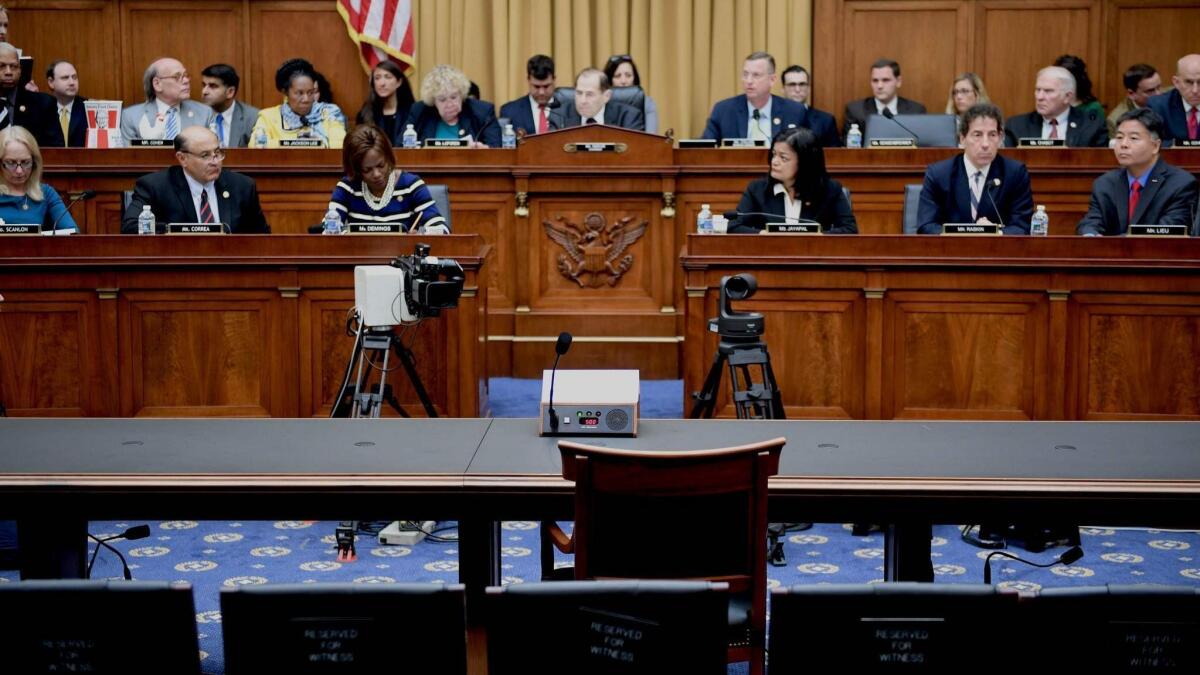Column: It’s not Ft. Sumter yet, but Trumpian snidery is tipping us into a constitutional crisis

What is a constitutional crisis?
At its most elementary, it’s a government emergency in which some of a nation’s citizens — generally with political power, an arsenal, or both — decide that the republic’s fundamental principles are not binding on them. They’re above the law.
Bent on nullification, anarchy or megalomania, the group resolves that, damn the torpedoes, they’re going to defy the mechanisms that limit power in government.
These mechanisms, of course, are designed to protect the citizenry against tyranny and chaos.
A constitutional crisis is inestimably grave.
First, it can stalemate the administrative functioning of a state. That hardly sounds fatal, but this kind of paralysis erodes the daily life of citizens.
Barr’s failure to show was pure provocation.
Eventually, a stalled government loses its legitimacy. Finally, a constitutional crisis can end in a government’s collapse — or, as we know from history, in civil war.
Atty. Gen. William Barr’s blithe decision to skip out on an appearance May 2 before the House Judiciary Committee seemed at first like routine partisan posturing in Washington. It didn’t exactly resound like the first shots on Ft. Sumter 158 years ago.
But when the chief lawyer of the federal government bucks a congressional subpoena — in this case, for the unredacted Mueller report and its underlying evidence — something is seriously rotten in our executive branch. (Barr offers a weak defense — he can’t show Congress grand jury testimony — ignoring easy remedies for the problem.)
Barr’s failure to show was pure provocation. He was, after all, spitefully skipping an appearance before the Democratic-controlled House Judiciary Committee, when he had readily appeared before the analogous committee in the Republican-controlled Senate. He is turning basic accountability partisan.
For our attorney general and anyone else who needs reminding: Both houses of the Congress represent a branch of government coequal with the executive branch. Barr can’t defy the legislature by fiat and stay in the Constitution’s bounds.
Barr’s absenteeism comes in the context of President Trump’s flat assertion of vast “protective executive privilege” over the findings of special counsel Robert S. Mueller III. “Protective executive privilege,” which some call a “constitutional myth” because the Constitution makes no provision for it, is an Eisenhower-era coinage.
Yes, the Supreme Court has generally upheld the power of the president to resist certain subpoenas for confidential information. But, according to United States vs. Nixon, a seminal Supreme Court decision in the Watergate scandal, executive privilege turns hollow when the material in question is deemed necessary for a judicial process.
That’s manifestly the case here. The Mueller report itself leaves no ambiguity about where it left the judicial process regarding obstruction of justice on the part of the president: in Congress’ hands. To make a just decision about impeachment or other constitutional remedies for the misconduct of Trump and his circle, Congress needs to see, and in some cases hear, the evidence.
For now, though, “protective executive privilege” is another key brick in Trump’s tweetering wall of words. The Supreme Court’s Watergate ruling made it clear that a president must comply with subpoenas in criminal matters; it was silent on congressional investigations, where no indictment has been made. This lacuna suggests we may see a U.S. vs. Trump sooner rather than later.
Treasury Secretary Steven T. Mnuchin offered a sideshow “tell” previewing Barr’s snub of the House Judiciary Committee and Trump’s flat defiance of Congress in April. He at least showed up to testify before the House Financial Services Committee, but he did so all but sneering at the committee chair, Rep. Maxine Waters (D-Los Angeles). He had more important places to be, he said.
Mnuchin sounded less like a Cabinet member addressing elected officials, and more like a kid saying he had no time for a math test because he needed to level up in “Resident Evil 2” on his XBox. As of Friday, he has his own opportunity to snub a House subpoena, this time for Trump’s tax returns.
Enter the Fray: First takes on the news of the minute »
While the snidery of Mnuchin, Trump and Barr sounds adversarial, it’s the exact opposite. It’s their effort to use media posturing and obstructionism to duck the productive adversarial system that keeps this country, this republic, alive.
The basic principle of separation of powers, which pits opposing factions against each other so they can check each other’s will to power, led the philosopher Immanuel Kant to conclude, that, with such a system, “the problem of setting up a state can be solved even by a nation of devils.”
Barr, Trump and Mnuchin have now shown open hostility to the legislative branch by refusing to submit to its oversight. On Wednesday, the legislative branch pushed back when the House Judiciary Committee voted to hold Barr in contempt of Congress for defying its subpoena, and Rep. Jerrold Nadler (D-N.Y.) and House Speaker Nancy Pelosi declared that the nation had entered constitutional crisis.
The holy separation of powers is indeed imperiled, but it’s not nearly time for muskets and cannon fire. Now we turn to the gritty, devilish business of the third branch — the judiciary. We will once again test — this time in the courts — whether this nation or any nation can long endure.
Twitter: @page88
Follow the Opinion section on Twitter @latimesopinionand Facebook
More to Read
A cure for the common opinion
Get thought-provoking perspectives with our weekly newsletter.
You may occasionally receive promotional content from the Los Angeles Times.






